Where does your rubbish and recycling go?
How and where your rubbish and recycling is processed.
After we collect your rubbish and recycling, it all comes to our facility at Padworth in West Berkshire, which is managed and operated by our contractors Veolia.
Please watch our short video here of the process.
Find out how we recycle different materials below.
Plastic bottles, tins/cans and aerosols
Plastic bottles, cans and aerosols are separated and then further sorted into different grades. They are then bailed ready for transport to reprocessors where they are turned into new products such as new milk bottles and drink cans.
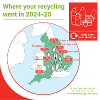
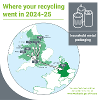
Paper and card
Paper and card is bulked (compacted together) at the transfer station, ready to be transported to paper mills where it is turned into more paper and card.
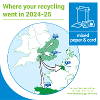
Glass
Glass goes to smelters in London where it is melted down and used to make new bottles, jars and aggregate.
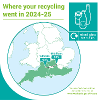
Food and garden waste
All food and garden waste comes to our in-vessel compost facility at Padworth. It is turned into PAS 100 certified soil conditioner for use by local farmers and landscapers.
Watch our YouTube video to find out more.
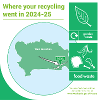
Textiles
Textiles are sent to a huge warehouse in the UK to be hand-sorted. Items are sorted into different qualities of clothing and textiles to ensure best reuse when distributing worldwide.
General waste
Once recyclable materials are placed in the black bin or general waste skips at the Household Waste Recycling Centre (HWRC), they are not separated for recycling. These materials are treated as general waste and are sent for Energy from Waste or landfill.
In 2024/25, West Berkshire Council sent:
- 87% of general waste to Energy from Waste (EfW) facilities, where it was incinerated to generate electricity
- 13% of general waste to landfill
While EfW helps reduce landfill use and generates energy, it is not a substitute for recycling. Recycling conserves resources, reduces carbon emissions, and supports a circular economy. That's why it's so important to:
- use your kerbside recycling bins correctly
- sort your waste properly when visiting the HWRC
- avoid placing recyclable items in general waste
Please make sure you reduce your waste and recycle as much as you can.
Your recycling efforts are helping to fight climate change by preserving valuable resources and reducing CO2 emissions.
Our waste and recycling partner, Veolia, works with us to help everyone recycle as much as possible. They provide the right recycling services for everyone and advice on how to minimise your waste.
Veolia uses UK outlets for the materials they collect where they are available. For example, they use their own milk bottle reprocessing plant in East London, which turns HDPE recycled bottles into food grade plastic pellets. The pellets are then used by the dairy industry to make new bottles. Where overseas processing is required, Veolia only exports highly recyclable and valued material that has been separated by grade, such as sorted aluminium cans.
Veolia employ, enforce and police a stringent duty of care audit to ensure that material goes to genuine outlets that recycle it into new products. The company's practices meet and exceed the legal requirements for recycling. Veolia's dedicated team audits, visits and rigorously monitors all outlets for recycling commodities to ensure the highest standards are met. They also work closely with the Environment Agency to reduce waste crime, ensuring that every step of the recycling chain is accountable and efficient. This means that when you recycle, it will go to the right place.




